英语ⅱ人教新资料unit1culturalrelics学案(2)
Unit1《Culturalrelics》学案2(人教版必修2)
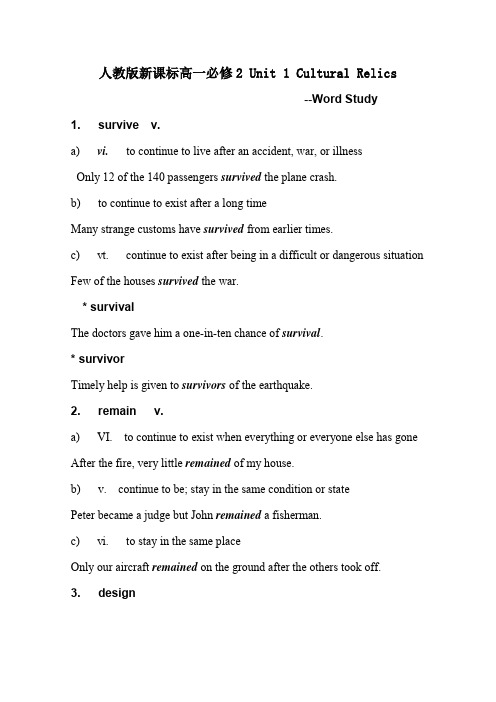
人教版新课标高一必修2 Unit 1 Cultural Relics--Word Study1. survive v.a) vi. to continue to live after an accident, war, or illnessOnly 12 of the 140 passengers survived the plane crash.b) to continue to exist after a long timeMany strange customs have survived from earlier times.c) vt. continue to exist after being in a difficult or dangerous situation Few of the houses survived the war.* survivalThe doctors gave him a one-in-ten chance of survival.* survivorTimely help is given to survivors of the earthquake.2. remain v.a) VI. to continue to exist when everything or everyone else has gone After the fire, very little remained of my house.b) v. continue to be; stay in the same condition or statePeter became a judge but John remained a fisherman.c) vi. to stay in the same placeOnly our aircraft remained on the ground after the others took off.3. designa) n. [ C] a drawing that shows how something will be made or what it will look likeWe are going to discuss the design for the new sports centre.? designs for a dress, a garden, an aircraftb) n. [ U J general arrangement or planning (of a building, book, machine, picture,The building seats 2000 people, but is of poor design.c) v. to make a drawing or plan of something that will be made or built A new national curriculum is designed for high school students.* be designed for sb./sth.; be designed to do sth.4. fancyadj. a) expensive and fashionableIt's a fancy pair of shoes.b) having a lot of decoration or bright colours, or made in a complicated wayI just want a basic sports coat-------nothing fancy.n. [C ] thing imagined, [ U] power of the mind to imagineDid I really hear someone come in, or was it only a fancy ?? take sb's fancyWe can go anywhere that takes your fancy .v. a) to like or want something, or want to do something (informal) Sorry, but I don't fancy going out tonight.b) to think that something is true [(formal)I fancied I heard footsteps behind me but I was too nervous to look back.5. reception n.a) [ U] the way people react to something or someoneWe are preparing rooms for the reception of guests.b) [sing] (Brit) the place in a hotel or office building where people go when they arriveYou can sign your name at the reception.c) [ C] a large formal party to celebrate an event or to welcome someone It is an official reception for the foreign visitors.? receptionistForeign visitors will expect the receptionist to have a very good knowledge of the city.6. wondern. a) [ U] feeling of surprise and admiration for something very beautiful or new to youThe sight of the Summer Palace filled us with wonder.b) [C] something that makes you feel surprise and admiration The Great Wall is one of the wonders of the world.v. a) to feel surprised and unable to believe something Sometimes I wonder about his behaviour.b) feel curious (about sth.); ask oneself questionsI wonder how James is getting on these days.7. removea) vt. take sth./sb.away from one place to another After dinner, Mother removed the dishes (from the table).b) vt. get rid of sth.Remove all the fat, then cut the meat into cubes.。
人教新课标高中英语必修二Unit 1 Cultural relics导学案(2)

Book 2 Unit 1 Cultural relicsReading:In search of the Amber Room 导学案Step 1 Warming upBrainstormActivity 1: Do you know any cultural relics in your county? _______________________________ Activity 2: Introduction of the cultural relic in Xinfeng county –Zhangtian cake mold.Zhangtian cake mold, the traditional folk (民间的) handicraft (手工的) skills of my county,Zhangtian village, is a cultural relic of ourprovince. It was created by Zhang ancestor (祖先)in the late Ming and early Qing Dynasty and ithas a history of more than 300 years. The process(过程) of the production involves (涉及) art, sculpture (雕刻) and other skills. It is rich in patterns (图案) with characters, flowers, animals and so on. The products are mainly sold to Beijing, Shanghai, Guangzhou, Shenzhen, Hong Kong, and other large and medium-sized (中等) cities.Step 2 Pre-readingActivity 1: Lead-in: Basic knowledge about amber.What is amber?Amber is the fossil(化石) form of resin(树脂) from trees.It takes millions of years to form. It is more expensive than gold.Activity 2: Look at the word cloud and make up some sentences with the words you see to predict what the passage is talking about.Eg: The Amber room used to be a palace.Activity 3: Look at the title of the reading- In search of the Amber Room, can you predict what the passage is talking about?Questions:Where is the Amber Room now ? __________________________________________ Step 3 While-reading.Activity 1: Read the passage and find out why the author wrote the passage.The reading passage tells us __________________________, a cultural relic of two countries:_________________________.Activity 2: Read the passage and match the main idea of each paragraph. ( Ex. 2 on Page 2 ) Para. 1 A. How did the Amber Room become one of the wonders of the world?Para. 2 B. How was a new Amber Room built?Para. 3 C. How did the Amber Room get lost?Para. 4 D. How was the Amber Room made?Para. 5 E. Why did the King of Prussia give the Amber Room to the Czar of Russia as a gift? Activity 3: Read the passage again and complete the sentences with proper words in paragraph 1.1.Material:____________________ were used to make it.2.Colour: a beautiful _____________ colour like ________.3.Design: in the ___________________ in those days4.Decoration: decorated with ____________________5.Time spent in making it: It took the country’s best artists__________ to make it.Activity 4: Complete the flow map with the names of the persons mentioned in the text .Frederick ⅠActivity 5: Complete the flow map and add more details to them.Activity 6: Author’s attitude ?What’s the author’s attitude towards the Amber Room? ___________________________________ Post –reading:After learning the reading passage, find out some information about the cultural relics in your county. Write about 5 to 6 sentences about it, including names, history, characteristics and so on.。
人教版高中英语必修二教案:Unit+1+Cultural+Relics+(2).doc

Unit 1 Cultural RelicsPeriod 2 GrammarThe Restrictive and Non-restrictive Attributive ClauseTeaching contentsNew Senior English for China Student’s Book2Module 2 Unit 1 Cultural RelicsPeriod 2 GrammarThe Restrictive and Non-Restrictive Attributive ClauseTeaching analysisThis period mainly introduces non-restrictive attributive clause and the differences between restrictive and non-restrictive clauses. The students have already learnt restrictive clause before, which can lay a foundation for learning and mastering the contents of this class.As we all know, grammar is always considered boring and difficult to teach and learn, so I will try to transfer the traditional teacher-centered approach to student-centered approach, combine teaching with pleasure, and motivate the students to discover and solve the problems themselves. And then they can learn and master this new grammatical structure in pleasant and relaxed atmosphere.Teaching goals※Compare and master the differences between restrictive and non-restrictive attributive clauses, esp. the use of “which”﹠“that”.※Enable students to choose the proper relatives.※Improve students’ ability of speaking and writing using attributive clause. Teaching important and difficult points※The comparison between the restrictive and non-restrictive clauses※Get the students to use the restrictive and non-restrictive attributive clauses properly to describe some things and persons.※Get students to master this new grammatical structure※Improve students’ ability of speaking and writing using attributive clauseTeaching methods※Inquiry-based and Student-centered Teaching Approach※Cooperative and Inductive Methods※Multimedia Computer Assisted InstructionTeaching aidsA computer and some slide showsTeaching proceduresLead-in → Comparison﹠Induction → Summary → Exercises→ Evaluation → HomeworkStep Ⅰ Lead-in(3’)First, I design a short introduction of myself using some attributive clauses, and show some pictures at the same time. I think this can arouse the students’ interest and draw their attention to the teaching contents.I will say: Today, I will lead you to discuss the grammar of this unit: The non-restrictive attributive clause. First, let me introduce myself to you.I’ m Zhao Liyuan who will give you this lesson.I’ m a teacher who comes from No. 1 Middle School.I am teaching in the new campus which was built last year.The campus is completely new, where about 4,000 students live and study happily. There are many beautiful flowers which smell sweet in summer.Welcome to visit the new campus of our school, where I believe you can make many friends.Then, I will show the sentences I said on the screen, and ask the students to find some different ones from what they have learnt. The students can easily find 1, 4, 6 are different, and they all have a comma. I will tell them this kind of attributive clause with a comma is called the non-restrictive attributive clause. Of course they know the comma is not the only difference between them. So I will lead them to compare some pairs of sentences to find other differences.Step Ⅱ Comparison and Induction(15’)In this part, I will give the students some groups of sentences, and raise some questions to help them find out the differences between restrictive and non-restrictiveclauses. Ask the students discuss the questions with partners or in small group, 1 or 2 minutes later, ask one or two students to report the result of their discussion, and then I will do some complements and make a summary.1) This is the most beautiful girl that I have ever seen.2) This is the most beautiful girl in No.6 middle school, whom I saw in Class 1.1) Zhangjiakou is a city (that/which) I’ve always wanted to visit.2) Zhangjiakou is a beautiful city, which I’ve always wanted to visit.1)The teacher showed us a photo which she took in her office.老师给我们看了一张她在办公室拍的照片。
学案:Unit 1 Cultural relics 学案(新人教版必修2)
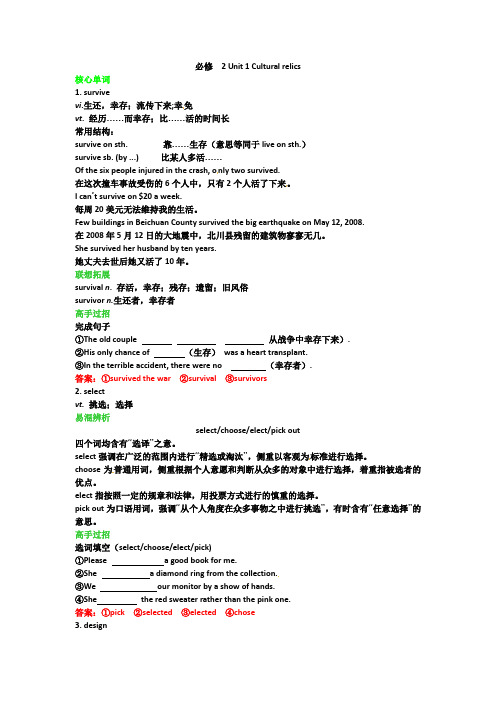
必修 2 Unit 1 Cultural relics核心单词1. survivevi.生还,幸存;流传下来;幸免vt. 经历……而幸存;比……活的时间长常用结构:survive on sth. 靠……生存(意思等同于live on sth.)survive sb. (by ...) 比某人多活……Of the six people injured in the crash, o nly two survived.在这次撞车事故受伤的6个人中,只有2个人活了下来。
I can’t survive on $20 a week.每周20美元无法维持我的生活。
Few buildings in Beichuan County survived the big earthquake on May 12, 2008.在2008年5月12日的大地震中,北川县残留的建筑物寥寥无几。
She survived her husband by ten years.她丈夫去世后她又活了10年。
联想拓展survival n. 存活,幸存;残存;遗留;旧风俗survivor n.生还者,幸存者高手过招完成句子①The old couple 从战争中幸存下来).②His only chance of (生存)was a heart transplant.③In the terrible accident, there were no (幸存者).答案:①survived the war ②survival ③survivors2. selectvt.挑选;选择易混辨析select/choose/elect/pick out四个词均含有“选译”之意。
select强调在广泛的范围内进行“精选或淘汰”,侧重以客观为标准进行选择。
choose为普通用词,侧重根据个人意愿和判断从众多的对象中进行选择,着重指被选者的优点。
elect指按照一定的规章和法律,用投票方式进行的慎重的选择。
高一英语必修2unit1culturalrelics词汇导学案
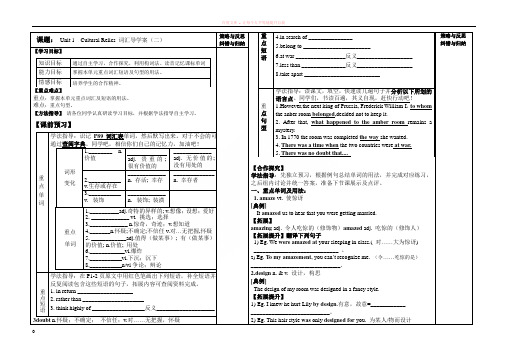
课题: Unit 1 Cultural Relics 词汇导学案(二)策略与反思 纠错与归纳【合作探究】学法指导:先独立预习,根据例句总结单词的用法,并完成对应练习,之后组内讨论并统一答案,准备下节课展示及点评。
一、重点单词及用法: 1. amaze vt. 使惊讶 [典例]It amazed us to hear that you were getting married. 【拓展】amazing adj. 令人吃惊的(修饰物)amazed adj. 吃惊的(修饰人) 【拓展提升】翻译下列句子1) Eg. We were amazed at your sleeping in class.( 对……大为惊讶) _____________________________ 。
2) Eg. To my amazement , you can ’t recognize me. (令……吃惊的是)___________________________________。
2.design n. & v. 设计,构思 [典例]The design of my room was designed in a fancy style. 【拓展提升】1) Eg. I knew he hurt Lily by design .有意,故意=____________ ___________________________。
2) Eg. This hair style was only designed for you. 为某人/物而设计重点短语4.in search of _______________5.belong to _______________________6.at war _________________反义___________________7.less than _______________反义___________________8.take apart __________________________重点句型学法指导:读课文,填空,快速读几遍句子并分析以下所划的语言点。
英语ⅱ人教新资料unit1culturalrelics学案(2)
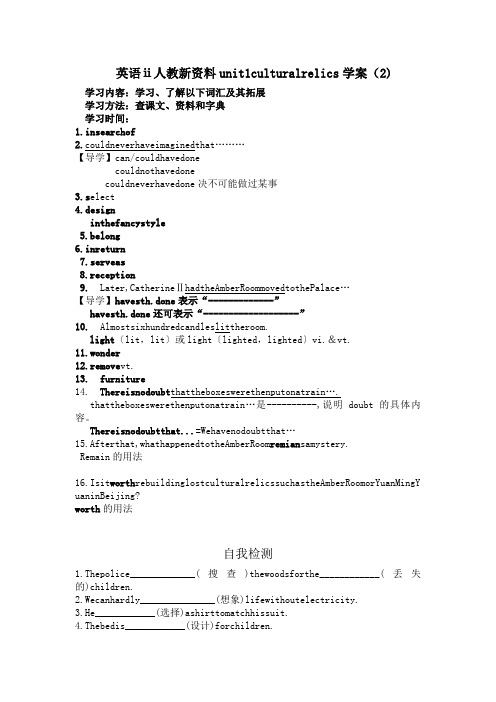
英语ⅱ人教新资料unit1culturalrelics学案(2)学习内容:学习、了解以下词汇及其拓展学习方法:查课文、资料和字典学习时间:1.insearchof2.couldneverhaveimaginedthat………【导学】can/couldhavedonecouldnothavedonecouldneverhavedone决不可能做过某事3.s elect4.designinthefancystyle5.belong6.inreturn7.serveas8.reception9. Later,CatherineⅡhadtheAmberRoommovedtothePalace…【导学】havesth.done表示“-------------”havesth.done还可表示“-------------------”10. Almostsixhundredcandleslittheroom.light〔lit,lit〕或light〔lighted,lighted〕vi.&vt.11.wonder12.remove vt.13.furniture14. Thereisnodoubt thattheboxeswerethenputonatrain….thattheboxeswerethenputonatrain…是----------,说明doubt的具体内容。
Thereisnodoubtthat...=Wehavenodoubtthat…15.Afterthat,whathappenedtotheAmberRoom remian samystery.Remain的用法16.Isit worth rebuildinglostculturalrelicssuchastheAmberRoomorYuanMingY uaninBeijing?worth的用法自我检测1.Thepolice_____________(搜查)thewoodsforthe____________(丢失的)children.2.Wecanhardly_______________(想象)lifewithoutelectricity.3.He____________(选择)ashirttomatchhissuit.4.Thebedis____________(设计)forchildren.5.Thosepresentsaretoo_____________(奇特)forme.5.Chinaisadevelopingcountry____________(属于)tothethirdworld.6.Thesmallroomusedto____________(充当)asa_______________(接待)room.7.Pleasehaveyourbag____________(拿走)fromtheseatsothatIcansitdown.8.The____________(点燃的)candle______________(照亮)herpaleface.9.I____________(想明白)wheretospendtheweekend.Timeworks____________(奇迹).10.Theroomwassmallandcontainedtoomuch_________________(家具).11.Anumberofproblems____________(遗留)tobesolved.12.Themovieissomovingthatitis____________(值得)seeingagain.答案;【检测】1,B2,A3,D4.,D5,C6,B7,B8,C9,A10,designed11,design12,designed13,D14,B15,A16,C17,A18,A19,D20,B21,D22,C,23,略24,D25,C自我检测1,searched【也可用进行时】,missing,2,imagine3,select 4,designed5,fancy,6,belonging7.serve,reception8,lighted,lit9,wonder10,wonders11,furniture12,worth备课参考:1.insearchof查找;搜寻Theyareinsearchofthemissinggirl.(表语)他们正在查找那个失踪的女孩.Ilookedeverywhereinsearchofmyglasses.(目的状语)【拓展】search用法searchsb/sth搜查某人/某处〔search后面接的是搜索的对象〕searchforsb/sth查找某人/某物〔for后面接的是搜索的目标〕(与lookfor 的意思接近但指查找的更认真、更完全)searchsb/sthforsb/sth搜查〔某人/某处〕以查找〔某人/某物〕1)Thepolicesearchedhim______drugs.警察搜查他,看他身上是否有毒品。
高中英语unit1Culturalrelics学案新人教版必修2(可编辑修改word版)
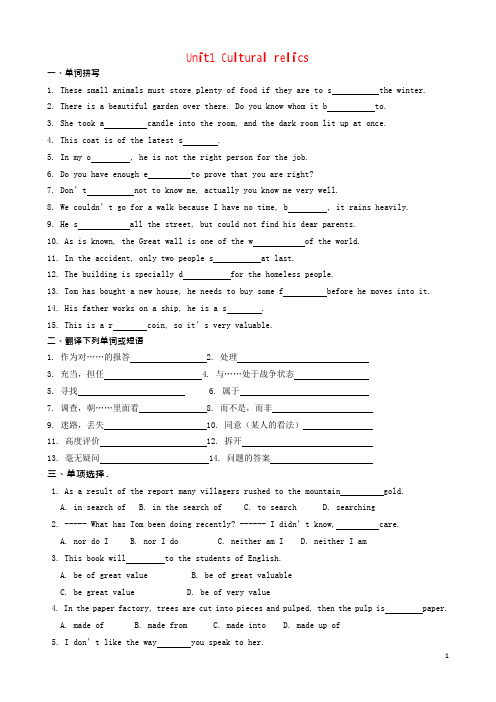
U n i t1C u l t u r a l r e li c s一、单词拼写1.These small animals must store plenty of food if they are to s the winter.2.There is a beautiful garden over there. Do you know whom it b to.3.She took a candle into the room, and the dark room lit up at once.4.This coat is of the latest s .5.In my o , he is not the right person for the job.6.Do you have enough e to prove that you are right?7.Don’t not to know me, actually you know me very well.8.We couldn’t go for a walk because I have no time, b, it rains heavily.9.He s all the street, but could not find his dear parents.10.As is known, the Great wall is one of the w of the world.11.In the accident, only two people s at last.12.The building is specially d for the homeless people.13.Tom has bought a new house, he needs to buy some f before he moves into it.14.His father works on a ship, he is a s .15.This is a r coin, so it’s very valuable.二、翻译下列单词或短语1. 作为对……的报答2. 处理3. 充当,担任4. 与……处于战争状态5. 寻找6. 属于7. 调查,朝……里面看8. 而不是,而非9. 迷路,丢失10. 同意(某人的看法)11. 高度评价12. 拆开13. 毫无疑问14. 问题的答案三、单项选择.1.As a result of the report many villagers rushed to the mountain gold.A.in search ofB. in the search ofC. to searchD. searching2.----- What has Tom been doing recently? ------ I didn’t know,care.A.nor do IB. nor I doC. neither am ID. neither I am3.This book will to the students of English.A.be of great valueB. be of great valuableC. be great valueD. be of very value4.In the paper factory, trees are cut into pieces and pulped, then the pulp is paper.A.made ofB. made fromC. made intoD. made up of5.I don’t like the way you speak to her.A./B. in thatC. whichD. of which6.What he did what he said moved us.A.more thanB. rather thanC. less thanD. no more than7.is known to us all is that America is a developed country the First World.A.Which; belonging toB. As; belongingC. What; belonging toD. It; belonging8.We don’t doubt he can do a good job of it.A.whetherB. thatC. whatD. why9.The woman, when how her husband was injured, began to cry.A.askedB. to askC. askingD. ask10.------ Tom is never late for work. Why is he absent today?------ Something to him.A.must happenB. should have happenedC. could have happenedD. must have happened11.Never in my life the lesson he gave me.A. I will forgetB. will I forgetC. had I forgetD. did I forget12.I’m afraid that I don’t what you said.A.agree toB. agree onC. agree withD. agree about13.He was by his colleagues though he himself didn’t think he had done anything special.A.thought little ofB. thought poorlyC. thought highly ofD. thought highly14.It was not until that to study English.A. he came to Beijing; he beganB. did he come to Beijing; he beganC. he came to Beijing; did he beganD. did he came to Beijing; did he begin15.Children who are always by their parents soon become spoiled.A. given upB. given up toC. given in toD. given in四、单句改错1.How I wished I could made myself understanding fully in English.2.The idea seems good but it needs to be tried on.3.This book is the production of twelve-years' hard labour.4.Foreign students have brought about their new customs and habits.5.We'd like to sell the computer to you with 3,500 yuan.6.Which school did you study last year?7.Mr Zhang is considered a honest man.8.He is from an European country.9.I have been used to work late at night.10.That is not a good idea to build houses on sand.五、完形填空阅读下面短文,从 36-55 各题所给的四个选项(A、B、C 和 D)中,选出可以填入空白处的最佳选项并在答题卡上将其涂黑。
新人教版高中英语必修2Unit1 Cultural relics教案2
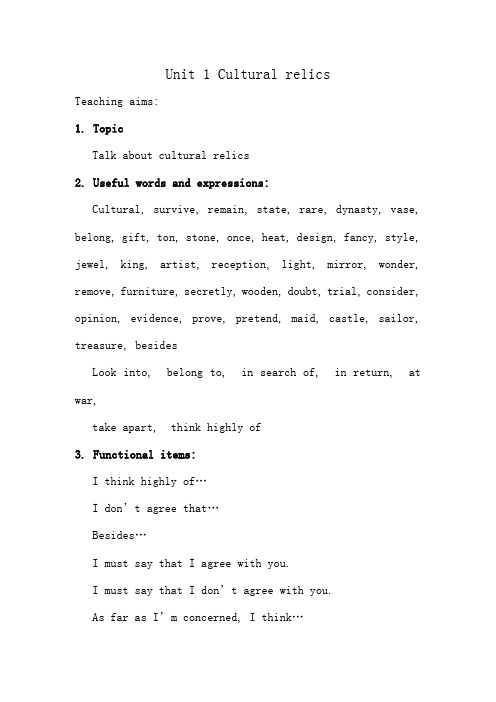
Unit 1 Cultural relicsTeaching aims:1. TopicTalk about cultural relics2. Useful words and expressions:Cultural, survive, remain, state, rare, dynasty, vase, belong, gift, ton, stone, once, heat, design, fancy, style, jewel, king, artist, reception, light, mirror, wonder, remove, furniture, secretly, wooden, doubt, trial, consider, opinion, evidence, prove, pretend, maid, castle, sailor, treasure, besidesLook into, belong to, in search of, in return, at war,take apart, think highly of3. Functional items:I think highly of…I don’t agree that…Besides…I must say that I agree with you.I must say that I don’t agree with you.As far as I’m concerned, I think…As I see it…Don’t you agree /think that…I can’t help thinking that…I would like to say…In my opinion/view…Personally, we should…Well, obviously we should…The point is ….4. StructuresThe attributive clause with that/ which /who /where/ whenA cultural relic is something that has survived…It is your job to look into any reports of cultural relics that have been found in China.This gift was the Amber Room, which was given this name because…Later, Catherine II had the Amber Room …outside St Petersburg where…This was a time when the two countries were at war. Teaching proceduresPeriod 1 (Reading)Step 1. Warming upThe warming-up exercise raises Ss’ awareness that there are some well-known cultural relics both at home and abroad. Ask the Ss to try their best to think of the cultural relics that they know.1. Ss say what they know about cultural relics.2. Teacher may summarize like this:Cultural relics are traces or features surviving from a past age and serving to remind people of them. They represent the culture of a place and some periods of history. Of course, some of them are in danger because they are being destroyed.3. Ask the Ss to give some examples of the cultural relics that are in the need of being protected.Step 2. Pre-reading1. Ss discuss and answer:How would you feel if a cultural relic got lost? Why?If you find a cultural relic, what will you do with it?2. Ss look at the two pictures on page 1-2. Ask them if they know what it is called.Step 3. While-reading1. Ss read and find the answers to the following questions:1)Why is it called the Amber Room?2)What happened to the Amber Room?2. Second reading: Ss read again and finish comprehending.3. Listening: Ss listen to the passage and get the main idea of each paragraph.Main idea:Paragraph 1. We can know that the Amber Room has a strange history and know something about its design and building. Paragraph 2. We can know the history of the Amber room and its functions in Russia.Paragraph 3. It tells us that Catherine II had the Amber Room moved to the palace outside St Petersburg.Paragraph 4. It tells us that the Nazi German army stole the Amber Room in September, 1941. After that the Amber Room remains a mystery.Paragraph 5. It tells us that the Russians and Germans have built a new Amber Room at the summer palace, following the old photos.Step 4. After-reading1. Ss discuss and answer: what they can do to protect our cultural relics.2. DebatingSs divided into two parts and debate.Topic: We should rebuild Yuan Mingyuan.We should not rebuild Yuan Mingyuan.Homework1. Recite the key sentences in the text.2. Retell the text.Period 2.(Language learning and grammar)Step 1. RevisionSs try to retell the text, using their own words.Step 2. Language points1. insist that2. 情态动词+ have done3. be made into4. be at war5. remain6. think highly ofStep 3 Discovering useful words and expressions1. Ss read the passage again and try to find word which means each of the meaning on page3,part 1.2. Teach the Ss how to use the dictionary to learn the usageof the phrase: belong to.Step 4. Grammar: The attributive clause1. Ss read the following sentences and try to find the rules.1)It is your job to look into any reports of cultural relics that have been found in China.2) This gift was the Amber Room, which was given this name because…Ask the Ss themselves to find the difference between the two sentences.3. Tell Ss the differences between restrictive attributive clause and non- restrictive attributive clause. Step 5. PracticeSs finish exercises 2 and 3 on page 4.Homework1. Ss finish Wb exercise: using works and expressions.2. Ss finish Wb exercise: using structures.3. Ss collect some information of the cultural relics that are in danger.Period 3. SpeakingStep 1. Revision1. Check Ss’ homework.2. Ask the Ss to say something about what they have collect about the cultural relics that are in danger.Step 2. Lead-in1. Ss watch videos about the world cultural relics.2. Ss find some cultural relics that are in danger and discuss what they will do with them.Step 3. Speaking taskT: China has tens of thousands of cultural relics. Perhaps it is not possible or necessary to save all of them. For example, Bejing is famous for its lanes or traditional houses and yards. Some people say that only the best ones should be saved. Others disagree, and say they make the capital a special place. Now, let’s have a discussion about this in two sides:Do you think China should save all of its cultural relics? Step 4. WritingAsk the Ss to write an article of 100-200 words about the whole discussion and express your opinion at the same time. Homework1. Review the attributive clauses.2. Remember the sentences that express one’s idea. Period 4. ReadingStep 1. Pre-readingT: since cultural relics are important and useful, it’s necessary for everyone to protect them. After all, they belong to the whole world. so today, we’ll read a passage that is about a common person who saves the cultural relics—Big Feng to the rescue. Read the passage for the first time and answer why Big Feng wants to save cultural relics. Step 2. Reading (P44)1. Ss read the passage again and answer the following questions:1). How does he save the cultural relics of his hometown?2). What does “a big heart”mean? In which ways does Feng Jicai show that he has a big heart?3). Why does he think it is more important to do this than to write his novels?4). It is very time-consuming and expensive for Feng Jicai to take care of cultural relics. Can you think of some other ways to help him with his projects?Step 3. Reading, listening and writing1. Ss read the passage on page 5.2. Play the tape. Ss listen to what three people say they know about the missing Amber Room. As they listen, pretend that they are judges.3. Ss listen again and take notes. Then fill in the forms on page 5. decide which of the three people they think gave the best evidence.Step 4. speaking and writing1. Discuss which person gave the vest evidence. Use the following expressions:Are you sure he/ she was telling the truth? How do you know that?How can you be sure he/ she was telling the truth?Why/why not?That can’t be true.I (don’t) believe …, because….I (don’t ) agree that…The truth is (not) easy to know.I can be proved.2. write down a short list of reasons for your choice. Period 5. ListeningStep 1. DictationT: we will have a dictation of the following sentences:1. Frederick William I, the king of Prussia could never nave imagined that his greatest gift to the Russian People would have such a strange history.2. Once it is heated, the amber can be made into any shape.3. It was made for the palace of Frederick.4. In 1716, Frederick William I gave it to Peter the Great, as a gift of friendship from the Prussian to the Russian People.5. In return, the Czar gave the King of Prussia 55 of his best soldiers.6. The Amber Room soon became part of the Czar’s Palace in St. Petersburg.7. Later, Catherine II had the Amber Room moved to the palace outside St Petersburg where she spent her summers.8. This was a time when the two countries were at war.9. There is no doubt that the boxes were then put on a train for Konigsberg, at that time a German city on the Baltic Sea.10. After that, what really happened to the Amber Room remains a mystery.11. I think highly of those who are searching for the Amber Room.Step 2. Listening (P41)1. Listen to the tape for the first time to get the main idea.2. Ss listen again and talks about a temple in Egypt, and then answer the questions on page 41.Step 3. Listening task (P44)Ss listen to the tape three times. At first time, try to get the main idea. At second time, try to spell the missing words as you hear them. At the last time, make some notes about I M Pei’s life. After listening, work in pairs. Each pair writes a short dialogue according to the notes.Period 6. WritingStep 1. Pre-writing1. Ask the Ss to read Johann’s letter first.2. Ss choose their writing models.Step 2. While-writing1. Ss collect their ideas for the letter. Write them down in order.2. Ss begin to write their letters.3. Choose some letters to show in the class.Step 3. Writing task (P46-47)1. Ss choose one cultural relic in their hometown that they think is worth saving. Write a letter to all the students of their school to encourage them to help save the cultural relic. They can use the model on page 46 as a guide.2. Ss check the answers each other.3. T checks the answers in class.Step 4. Project (P47)Ss finish the project as the following steps:1. Get together with three of your classmates and share your letters from the writing task with one another. Read each letter aloud.2. Know take the best ideas from each letter and make an even better plan to protect a cultural relic in your hometown. Explain your reasons.3. Organize your plan step by step to get more and more students to join the project.4. Prepare a short speech and have one member of your group tell you r classmates so that we can protect it well. Period sevenTeachers can use this period freely.Suggestion: Teachers can use this period to let Ss sum up what they have learned and explain what Ss couldn’t understand very well in this unit. Teachers can also add more practice in this period to consolidate what the Ss have learned. Finally, ask the Ss to finish checking yourself. It is very important to improve their learning.。
- 1、下载文档前请自行甄别文档内容的完整性,平台不提供额外的编辑、内容补充、找答案等附加服务。
- 2、"仅部分预览"的文档,不可在线预览部分如存在完整性等问题,可反馈申请退款(可完整预览的文档不适用该条件!)。
- 3、如文档侵犯您的权益,请联系客服反馈,我们会尽快为您处理(人工客服工作时间:9:00-18:30)。
英语ⅱ人教新资料unit1culturalrelics学案(2)本卷须知1.答题前,考生先将自己的姓名、准考证号填写清楚,将条形码准确粘贴在考生信息条形码粘贴区。
2、选择题必须使用2B铅笔填涂;非选择题必须使用0.5毫米黑色字迹的签字笔书写,字体工整、笔迹清楚。
3、请按照题号顺序在各题目的答题区域内作答,超出答题区域书写的答案无效;在草稿纸、试题卷上答题无效。
4、保持卡面清洁,不要折叠,不要弄破、弄皱,不准使用涂改液、修正带、刮纸刀。
学习内容:学习、了解以下词汇及其拓展学习方法:查课文、资料和字典学习时间:1.INSEARCHOF2.COULDNEVERHAVEIMAGINEDTHAT………【导学】CAN/COULDHAVEDONECOULDNOTHAVEDONECOULDNEVERHAVEDONE决不可能做过某事3.SELECT4.DESIGNINTHEFANCYSTYLE5.BELONG6.INRETURN7.SERVEAS8.RECEPTION9. LATER,CATHERINEⅡHADTHEAMBERROOMMOVEDTOTHEPALACE…【导学】HAVESTH.DONE表示“-------------”HAVESTH.DONE还可表示“-------------------”10. ALMOSTSIXHUNDREDCANDLESLITTHEROOM.LIGHT〔LIT,LIT〕或LIGHT〔LIGHTED,LIGHTED〕VI.&VT.11.WONDER12.REMOVEVT.13. FURNITURE14. THEREISNODOUBTTHATTHEBOXESWERETHENPUTONATRAIN….THATTHEBOXESWERETHENPUTONATRAIN…是----------,说明DOUBT的具体内容。
THEREISNODOUBTTHAT...=WEHAVENODOUBTTHAT…15.AFTERTHAT,WHATHAPPENEDTOTHEAMBERROOMREMIANSAMYSTERY.REMAIN的用法16.ISITWORTHREBUILDINGLOSTCULTURALRELICSSUCHASTHEAMBERROOMORYUANMINGYUA NINBEIJING?WORTH的用法自我检测1.THEPOLICE_____________〔搜查〕THEWOODSFORTHE____________〔丢失的〕CHILDREN.2.WECANHARDLY_______________〔想象〕LIFEWITHOUTELECTRICITY.3.HE____________〔挑选〕ASHIRTTOMATCHHISSUIT.4.THEBEDIS____________〔设计〕FORCHILDREN.5.THOSEPRESENTSARETOO_____________〔奇特〕FORME.5.CHINAISADEVELOPINGCOUNTRY____________〔属于〕TOTHETHIRDWORLD.6.THESMALLROOMUSEDTO____________〔充当〕ASA_______________〔接待〕ROOM.7.PLEASEHAVEYOURBAG____________〔拿走〕FROMTHESEATSOTHATICANSITDOWN.8.THE____________〔点燃的〕CANDLE______________〔照亮〕HERPALEFACE.9.I____________〔想知道〕WHERETOSPENDTHEWEEKEND.TIMEWORKS____________〔奇迹〕.10.THEROOMWASSMALLANDCONTAINEDTOOMUCH_________________〔家具〕.11.ANUMBEROFPROBLEMS____________〔遗留〕TOBESOLVED.12.THEMOVIEISSOMOVINGTHATITIS____________〔值得〕SEEINGAGAIN.答案;【检测】1,B2,A3,D4.,D5,C6,B7,B8,C9,A10,DESIGNED11,DESIGN12,DESIGNED13,D14,B15,A16,C17,A18,A19,D20,B21,D22,C,23,略24,D25,C自我检测SEARCHED【也可用进行时】,MISSING,2,IMAGINE3,SELECT4,DESIGNED5,FANCY,6,BELONGING7.SERVE,RECEPTION8,LIGHTED,LIT9,WONDER10,WONDERS11,FURNITURE12,WORTH备课参考:1.INSEARCHOF寻找;搜寻THEYAREINSEARCHOFTHEMISSINGGIRL.〔表语〕他们正在寻找那个失踪的女孩.ILOOKEDEVERYWHEREINSEARCHOFMYGLASSES.〔目的状语〕【拓展】SEARCH用法SEARCHSB/STH搜查某人/某处〔SEARCH后面接的是搜索的对象〕SEARCHFORSB/STH寻找某人/某物〔FOR后面接的是搜索的目标〕〔与LOOKFOR的意思接近但指查找的更仔细、更彻底〕SEARCHSB/STHFORSB/STH搜查〔某人/某处〕以寻找〔某人/某物〕1〕THEPOLICESEARCHEDHIM______DRUGS.警察搜查他,看他身上是否有毒品。
2〕THEYSEARCHEDTHEWOODS______ESCAPEDPRISONERS.他们搜查小树林寻找逃犯。
【检测】1.THEYWENTINDIFFERENTDIRECTIONS______________WATERINTHEDESERT.A.TOSEARCHB.INSEARCHOFC.SEARCHOFD.SEARCHING2.IHAVE____________MYMEMORY,BUTICAN'TREMEMBERHISNAME.A.SEARCHEDB.SEARCHEDFORC.BEENINSEARCHOFD.SERCHEDOF3.THEYCAMEHERE_________THECARTHEYHADLOST.A.SEARCHB.SEARCHFORC.SEARCHABOUTD.INSEARCHOF2.COULDNEVERHAVEIMAGINEDTHAT…绝不可能想到……【导学】CAN/COULDHAVEDONE过去本能做…而未做COULDNOTHAVEDONE不可能做过某事COULDNEVERHAVEDONE决不可能做过某事1〕HECOULDN'THAVEGONEABROAD,ASISAWHIMJUSTNOW.他不可能出国了,因为我刚才看见过他。
2〕COULDHEHAVETOLDHERTHENEWS?他可能告诉她这消息了吗?【拓展】SHOULD/OUGHTTOHAVEDONE表示“本来应该做某事,但事实上并没有做”WESHOULD/OUGHTTOHAVELENTHIMTHEMONEY,BUTWEDIDN'T.SHOULDN'THAVEDONE表示“本来不应该做某事,但事实上做了”SHESHOULDN'THAVETOLDATIETOHERMOTHER.MUSTHAVEDONE表示“过去一定做了某事”THESTREETSAREALLWET,ITMUSTHAVERAINEDDURINGTHENIGHT.MAY/MIGHTHAVEDONE表示“过去可能做了某事”--IDIDN'TSEEMARYATTHEMEETINGYESTERDAY.--SHEMIGHTHAVEBEENILL,IGUESS.NEEDN'THAVEDONE表示“过去本不必做某事,却做了”YOUNEEDN'THAVEWAITEDFORMRSMITH.HEDIDN'TCOMELASTNIGHT.【检测】4.----TOMISNEVERLATEFORWORK.WHYISHEABSENTTODAY?----SOMETHING___________TOHIM.A.MUSTHAPPENB.SHOULDHAVEHAPPENEDC.COULDHAVEHAPPENEDD.MUSTHAVEHAPPENED5.THEWEATHERTURNEDOUTTOBEFINEYESTERDAY.I________THETROUBLETOCARRYMYUMBRELLAWITHME.A.SHOULDHAVETAKENB.COULDHAVETAKENC.NEEDN'THAVETAKEND.MUSTN'THAVETAKEN6.THANKYOUFORALLYOURHARDWORKLASTWEEK.IDON'TTHINKWE__________ITWITHOUTYOU.A.CANMANAGEB.COULDHAVEMANAGEDC.COULDMANAGED.CANHAVEMANAGED7.----I'MSORRY,I__________ATYOUTHEOTHERDAY.----FORGETIT.IWASABITOUTOFCONTROLMYSELF.A.SHOULDNTSHOUTB.SHOULDN'THAVESHOUTEDC.MUSTN'TSHOUTD.MUSTN'THAVESHOUTED3.SELECT“挑选、选择、选拔”【导学】SELECT强调经过认真考虑之后做出的选择,它后面接名词作宾语,还可以在名词后接动词不定式作宾语的补足语。
常用的句型有:SELECTSTH.FORSB.;SELECTSB.TODOSTH.;SELECTSB/STHASSTH;SELECTSB./STH.FROMSTH.【拓展】MAKEONE'SSELECTION自己选择SELECTIVEADJ.挑选的;选择的BESELECTIVEABOUTSTH.注意挑选…….【检测】8.MRZHANG____________TOBECHAIRMANOFTHEMEETING.A.SELECTEDB.HASSELECTEDC.WASSELECTEDD.SELECTS9.THEY___________MARKTOTAKEPARTINTHECONFERENCETHEOTHERDAY.A.SELECTEDB.CHOOSEC.PICKD.WASCHOSEN4.THEDESIGNOFTHEROOMWASINTHEFANCYSTYLEPOPULARINTHOSEDAYS.【导学】DESIGNVT.〔1〕“计划、谋划、策划”DESIGNDOINGSTH.〔TODOSTH.〕打算做某事〔2〕“为…设计…;打算给……用”DESIGNSTH〔FORSB/STH〕STHBEDESIGNEDFORSB/STHSTHBEDESIGNEDASSTH STHBEDESIGNEDTODOSTH1〕THEBOOKISDESIGNED______CHILDREN.2〕THISCOURSEISDESIGNED_______ANINTRODUCTIONTOTHESUBJECT.这门课程是为作为该科目的入门课而开设的。
